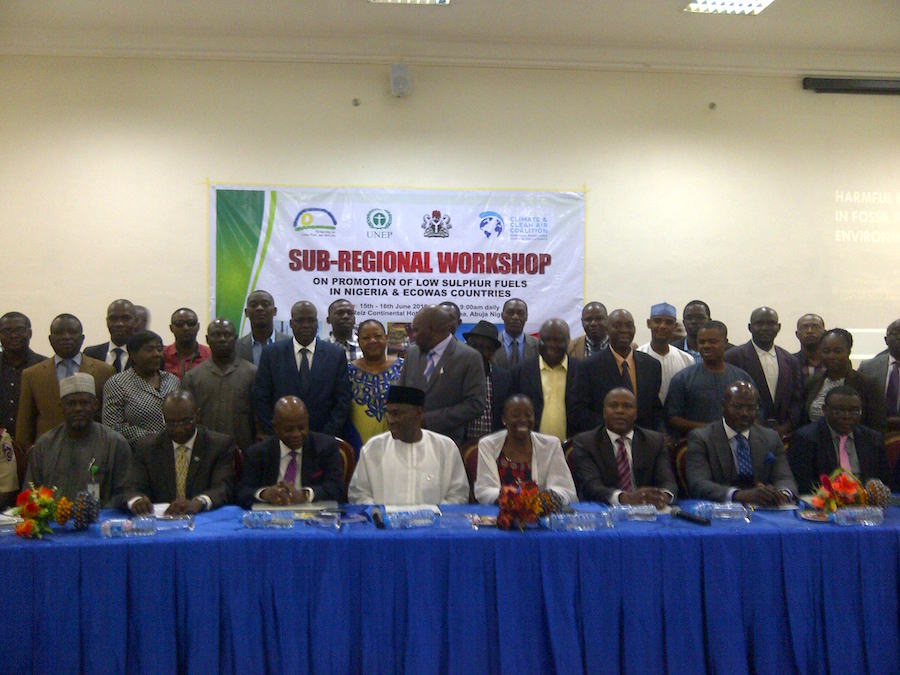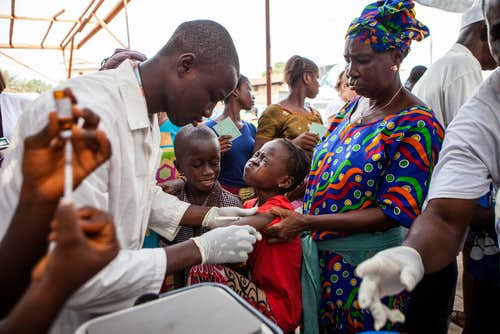
By Greg Odogwu
The Sub-Regional Workshop on the Promotion of low sulphur fuels in Nigeria and other ECOWAS Countries was organized by Nigeria’s Ministry of Environment in collaboration with the United Nations Environment Programme (UNEP), Climate and Clean Air Coalition and Partnership for Clean Fuels and Vehicles (PCFV), and took place in Abuja from 15th-16th June, 2016.
The event, which had in attendance four ECOWAS countries (Nigeria, Ghana, Togo and Cote d’Ivoire) was a déjà vu of sort. Fourteen years ago, in a similar bid to achieve a cleaner environment and improve public health, five West African countries – Benin, Chad, Niger, Nigeria and Togo – met in Cotonou, the capital of Benin Republic, to set a deadline to phase out the distribution of leaded petrol from their territories.
That 2002 decision was taken under the aegis of the World Bank’s Clean Air Initiative in Sub-Saharan African Cities. Then, top officials from the five West African nations agreed on a 15-point action plan to coordinate the gradual elimination of lead in petrol consumed here. Under the first phase, lead levels in petrol would be reduced to 0.15gms per litre by December 2003. By the following year, 2004, the petrol would become completely lead-free.
Of the five nations that met in Cotonou then, Nigeria was the only producer of oil and supplied most of the petrol consumed in West Africa. Its position was therefore critical to the action plan adopted. And, Nigeria delivered at the end of the day. It led the transition to a lead-free fuel West African sub-region. Perhaps, this was why the campaign for low-sulphur-in-fuel West Africa was set off in Abuja.
In those days, we worried about leaded petrol because of the extent of the health problems arising from its use. Reports showed that lead levels in the blood of the populace were very high compared to acceptable limits. These levels were associated with various pathological conditions such as anaemia, neuro-behavioural deficits, renal impairment, reproductive abnormalities and suppressed body defence system.
And in children there was irreversible damage to the brain and the nervous system, stunted growth, behavioural disorders, visual and hearing problems and general impairment of intelligence.
Today, it is about sulphur, a colourless, soluble gas with a characteristic pungent smell which forms sulphuric acid when combined with water. Sulphur dioxide is produced mainly from the combustion of fossil fuels that contain sulphur, such as coal and oil. Sulphur dioxide can cause respiratory problems such as bronchitis, and can irritate the nose, throat and lungs. It may cause coughing, wheezing, phlegm and asthma attacks. It has also been linked to cardiovascular disease. On the ecosystem, it causes acid rain, and deforestation; and also forms secondary particles (sulphates) that cause haze and reduce visibility.
The tragedy is that unlike what is obtainable in the developed world and some other African countries, there is high sulphur content in our fuels in the sub-region. And because of lack of awareness on the adverse effects of high sulphur content, the oil and automotive industries are not doing what is required to transition to low sulphur fuel like other countries are doing.
Some of these oil and gas industry players in fact turn a blind eye to the effects and keep importing high sulphur products; while also refusing to adapt their refining technologies to sulphur abatement.
Hence, the objectives of the Abuja workshop are to develop a road map towards achieving a standard of low sulphur fuel (a maximum of 50 parts per million) in the region by year 2020; and to collaborate within ECOWAS countries for the harmonization of Clean Fuel and Air Emission Standards.
There is a strong relationship between low sulphur and emissions reduction technologies.
For instance, the best way to clean a petrol engine emission is through a three-way catalytic converter. It performs three simultaneous tasks: reduction of nitrogen oxides to nitrogen and oxygen; oxidation of carbon monoxide to carbon dioxide; and oxidation of unburnt non-methane hybrocarbon to carbon dioxide and water. These reactions work better with low sulphur fuel of at least 50ppm and below (preferably 10ppm).
In view of the fact that some African countries like Morocco have already implemented 10ppm sulphur fuels and seven other countries in the continent have attained 50ppm suphur fuels, the workshop considered that countries in ECOWAS sub region could similarly attain this feat.
It also noted that lessons learnt from the successful phase out of lead in gasoline in the sub-region are essential in phasing out sulphur fuels in order to achieve the 50ppm goal by the year 2020.
The consensus therefore is that ECOWAS countries should adopt 50ppm as the Sulphur maximum limit in their imported fuel and diesel, while giving their refineries up to year 2020 to comply, as adopted by the African Refiners Association. No doubt, Nigeria is a natural leader in West Africa. This is why it would be wise to start with a regional adoption of emissions reduction strategies and templates that have worked in Nigeria, such as the ban of 2-stroke engine. ECOWAS countries should ban the manufacture or importation of two stroke motorcycle and tricycle engines.
Emission from 2-stroke engine is significantly higher than those from 4-stroke engines. It is estimated that particulate emissions from a single 2-stroke motorcycle is comparable to those from a diesel truck or bus.
Nigeria found it easy to ban the production or import of 2-stroke motorcycles and tricycles from 1st January 2012 because it was observed that pollution from 2-stroke engines is visible and already causing breathing problems in parts of Lagos and Kano. Secondly, in as much as the 4-stroke engine is slightly more expensive than the 2-stroke engine, the extra money is recovered in a few months as the 4-stroke is more fuel efficient. It also lasts longer. But most importantly, Nigeria banned the 2-stroke engine because the countries from where the motorcycle and tricycle engines are imported (China and India) have banned their use in their countries.
Granted, the enforcement of these policies is a different kettle of fish altogether; but it is still better to have a robust policy and strategy as a reference point, anytime. More so, with an ECOWAS vision of a vibrant economic integration, such policies will aid a concerted approach to foreign trade overtures.
There were some regional actions agreed by the 150 participants at the workshop. In a communiqué, it was declared that the ECOWAS Commission in collaboration with relevant stakeholders should:
Establish Regional Technical Meetings to develop the regional strategy and coordinate the implementation of low sulphur fuel and emission Standards;
Provide support in the implementation of the regional strategy of low sulphur fuels (50ppm or less) and emission standards;
Strengthen national and regional cooperation for formulation and enactment of common legislation for approval by the ECOWAS Council of Ministers; Strengthen cooperation, collaboration and information sharing among member states; Facilitate capacity building of all relevant stakeholders for effective participation in promoting low sulphur fuels and vehicular emission standards.
Nevertheless, personally I attach more importance to one of the observations of the workshop: “Alternative environment-friendly fuels sources should be encouraged in the region”. During the workshop, there was a well-received presentation on the utilization of Compressed Natural Gas (CNG) as a clean alternative source of fuel.
Renewable energy and energy efficiency is the way to go; and would effectively guarantee West Africa’s regional relevance in a world that is threatened by climate change but rapidly going green. The newly mapped West African green corridor, for instance, may lose its potential competitiveness if these germane renewable energy strategies and policies are not researched, instituted and enforced even before it comes alive.











